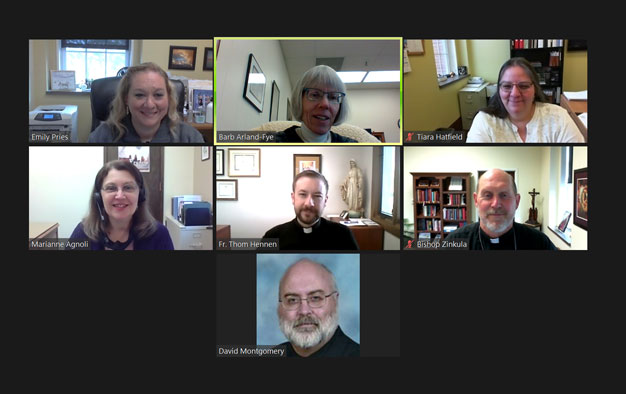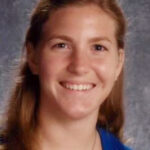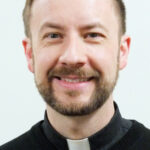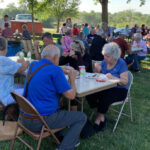
Members of the Gender Committee for the Diocese of Davenport include Bishop Thomas Zinkula, Father Thom Hennen, Deacon David Montgomery, Marianne Agnoli, Tiara Hatfield, Emily Pries and Lynne Devaney (not pictured).
By Barb Arland-Fye
The Catholic Messenger
When Bishop Thomas Zinkula formed the Gender Committee 19 months ago, he and the other members realized quickly how much they needed to learn — and to listen.
“When we first met, the idea was to put together a policy on how to handle sexual and gender identity issues that were beginning to arise in schools and parishes,” he said, “but we didn’t know enough about this topic yet, much less the people who would be affected by any policy we drafted and implemented.”
“We need to keep listening, but now we are ready to discern some steps to take. Pope Francis talks often about going to the peripheries to encounter people living there, to listen and dialogue with them, and to accompany them. That is what we are trying to do with the people who live on this periphery,” Bishop Zinkula said.
Committee members reported at their July 25 meeting on two initiatives underway: the development of a guide for pastoral accompaniment of sexual and gender minorities in schools and parishes, and outreach to them and their families.
Sexual and gender minorities (LGBTQ+ persons), are present in Catholic schools and parish faith-formation programs. That reality requires a renewed commitment to ensure that all people in schools and parish communities feel safe in person, property, space and opinion and are seen, known and loved as a child of God. All persons of faith are called to a life of holiness and destined to seek union with the divine, committee members say.
In addition to Bishop Zinkula, the committee’s members are Father Thom Hennen, vicar general and pastor of Sacred Heart Cathedral in Davenport; Deacon David Montgomery, chancellor and chief of staff; Lynne Devaney, superintendent of Catholic schools; Tiara Hatfield, director of human resources; Marianne Agnoli, coordinator of marriage and family life; Deacon Kent Ferris, director of Social Action and Catholic Charities; and Emily Pries, the bishop’s executive secretary.
Through video conferencing, the committee has listened to the stories of transgender persons, those who minister to them, as well as family members, medical professionals and others. They video-conferenced with Sister Luisa Derouen of central Kentucky who began ministering among the transgender community in 1999, and Deacon Ray Dever of the Diocese of St. Petersburg, Florida, whose eldest, adult child is transgender.
Dr. Peter Smith, a pediatrician with the University of Chicago Medical Center, spoke with the committee, as did Dr. James Anthony Sales, a child and adolescent psychiatrist in Rock Island, Illinois. Both doctors are practicing Catholics who shared their general experiences working with children and their families and acknowledged the complexities of the issue and the need for additional research and study in the medical field.
Committee members have read numerous articles and the policies created by some other dioceses, reviewed terminology and discussed the Vatican document, “Male and Female He Created Them: Toward a Path of Dialogue on the Question of Gender Theory in Education.” The committee also held an in-person discussion with diocesan schools’ principals and assistant principals. “We’re getting a better sense of the issue,” Bishop Zinkula said. “Everyone needs to be treated with dignity and respect. They deserve to be welcomed in the Church.”
“The Holy Spirit is leading us, we’re seeing how things evolve,” Agnoli said. “We’re looking at the possibility of forming a family support group. We want to have a conversation about how to best accompany the families of sexual and gender minorities. And, in regard to schools and Faith Formation programs, the guide will offer some ways for schools and parishes to begin their journey of awareness and to consider how they might best meet the needs of these students, parishioners and their families.”
Agnoli adds: “Being a Church of encounter requires that we meet individuals where they are, not where we may want them to be. It requires that we encounter people exactly how they are and without an agenda.” In his Pentecost address of 2013, Pope Francis said, “With our Faith, we must create a culture of encounter, a culture of friendship, a culture in which we find brothers and sisters, in which we can also speak with those who think differently, as well as others who hold other beliefs…. They all have something in common with us: they are images of God; they are all children of God.”












Your comments on gender diversity give me hope. I want to be better informed and wonder if you have a document going to schools, etc. that offers guidelines to teachers and parents. If so, I would be interested if there is a link you could send me.
Thank you for listening to others whose lives are impacted by gender issues, before you “guide” those of us hoping to respond with compassion and basic knowledge.
We do not have a document offering guidelines.
The diocesan Gender Committee is the study and research process.